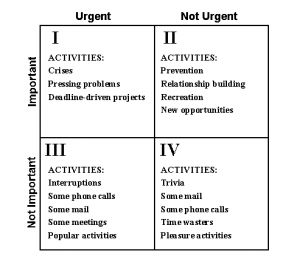
“We shall never cease from striving – and the end of all our striving is to arrive where we began and to know the place for the first time.” -TS Eliot
Stephen Covey passed on today at 79.
The following is pulled from his 7 Habits of Highly Effective People. I admit to have gleaned a few important morsels out of this book when a coach made me read it in college. I”m banking you will get something from it to.
Dont forget to “sharpen the saw.”
++++++++++
(The first three habits are called “Character ethics.” The second three habits are called “Personality ethics”)
#1 Be Proactive – Take responsibility for your own life: Have a Personal Vision
-behavior based on value vs feelings based on conditions
-proactive people carry the weather within (no such thing as bad weather) them and make the best of situations. Reactive people go the other way. Rainy day ruins everything.
-dont blame other people and circumstances for your happiness
-you have the power to choose
-your basic nature is to act and not be acted upon
Example: Man’s Search For Meaning By Victor Frankel
-how you deal with suffering
-the last ultimate freedom – “They could hurt my body.. but not hurt me”
-Conclusion: You are responsible for your own happiness and fulfilment
#2 Begin with the end in mind: Leadership Habit
-write you value system
-top line – what is it that we’re fundamentally about?
-dont tie yourself to history but to potential
#3 First thing first: Management Habit
-manage things but LEAD people. Dont manage people.
-can take control of time and events – as seeing how they relate to you mission
–reorganizing your life around your mission and then having the discipline to make it happen
-important vs urgent – must act upon it. Ringing phone.
-QUADRANTS: IMPORTANT (See Diagram Above)
Quadrant 1: urgent + important
Quadrant 2: not urgent + important: exercise, reading, relationships, education, etc
Quadrant 3: urgent + not important
Quadrant 4: not urgent + not important
PERSONALITY HABITS
#4 Think Win-Win
-agree to communicate until “we can find a solution we both feel good about”
-create new options – new alternatives
#5 Seek First to Understand… Then to be Understood
-Example: Try – “let me listen to you first”
-As opposed to the “collective monologue/ dialogue of the deaf”
-first listen – then talk
#6 Creative Synergy
-Creative solutions
-compromise = 1+1 = 1.5
-synergy = 1+1 = 5
-better solutions than alone
-authority vs martyrdom – win-lose or lose-win
-create Win-win OR no deal
-if we cannot get to win win – then lets go for no deal
-approach synergy with an abundance mentality
#7 Self Renewal: Sharpening the Saw
-Review and renew – teach then live
Common sense is NOT common practice
++++++
You can purchase Covey’s book here
And watch a great little video about “The Big Rocks” here



















Good ¡V I should definitely pronounce, impressed with your website. I had no trouble navigating through all tabs as well as related information ended up being truly simple to do to access. I recently found what I hoped for before you know it in the least. Quite unusual. Is likely to appreciate it for those who add forums or something, site theme . a tones way for your customer to communicate. Nice task..
One of the more impressive blogs Ive seen. Thanks so a large amount representing keeping the internet fashionable for a vary. Youve got style, class, bravado. I represent it. Please save it cheery because without the internet is definitely wanting in intelligence.
Thanks for your great post. Anyone interested can read the lastest FranklinCovey book (4 Disciplines of Execution) with a 45% discount- 4DISSEPT14. This discount only works until Friday so don’t miss out. http://bit.ly/4dxsept
I met Stephen Covey once at one of his conferences about twenty years ago.
He said the thing he feared most was “entropy’ If you don’t work the plan every day — all turns to chaos.
He could never make companies create the “habit of success”
Tamara Lackey recently said, “Willingness is endless, but will power runs out.
…so hard to keep trying daily